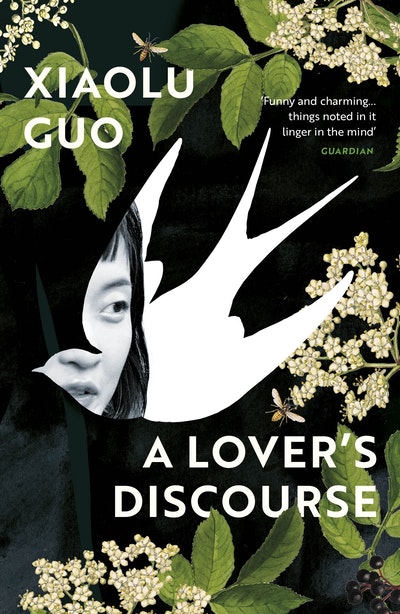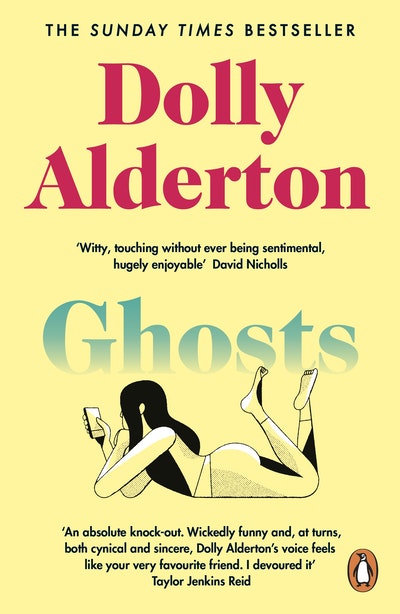- Published: 2 July 2021
- ISBN: 9781529112481
- Imprint: Vintage
- Format: Paperback
- Pages: 288
- RRP: $22.99
A Lover's Discourse
Extract
Prologue
Love at first sight is a hypothesis (Roland Barthes)
– I don’t believe in love at first sight.
– What do you mean? Wasn’t it clear the moment you picked the elderflowers by the park and we looked at each other? Or was it in that book club?
A few years after we moved in together, we had this conversation about love at first sight. I remember you said:
‘I don’t believe in love at first sight.’
I was taken aback. I thought we were definitely in love at first sight.
‘What do you mean? Wasn’t it clear the moment you picked the elderflowers by the park and we looked at each other? Or was it in that book club?’
You gave me a damp smile, as if my confusion proved that you were right.
But doesn’t love always start from first sight? I mean, before one reaches one’s thirties or forties. It’s only when we have a second thought about our first sighted love, that we might change our mind. You might ask, why does this happen before one reaches midlife? I don’t have a theory yet, but I think when we are young, our impulses take over our mind. Romantic love is always an impulse in my case. I am not old or wise enough to understand yet what else love could be.
All I knew in that first moment at the park was that you saw the way I had looked at you. Perhaps I should not be so sure that you saw how I looked at you. Well, you were still a complete stranger. You were from a culture I had no knowledge or deep understanding of. Besides, you were very tall and I was short. Height sometimes disorients our perspective.
ONE
西
WEST
The Elderflowers
– What will you do with them?
– The elders? I will head them and boil them up.
I didn’t know your name when we first met. No one introduced us. The only thing I remember is that you were picking roadside elderflowers.
We were in a park, Clapton Pond in northeast London. Some friends had arranged a picnic to celebrate a warm spring. But on that day, it was neither sunny nor warm. The clouds above London were making fun of us, with their fluffy cotton faces. The daffodils had faded, but the bluebells had just begun to bloom. Their clustered buds were nodding in the wind. Everyone was talking. And I was watching. Words didn’t come so naturally to my mouth. The English manner was something I found difficult to follow then. You were the only man who was not involved in any of the conversations. You walked away from us, and disappeared behind some shrubs by the roadside. I could see you were plucking milky-coloured plants by the edge of the park. When you came back, I saw that you were carrying a bunch of elderflowers. You glanced at me, with a look I could not quite read. Your eyes were blue green, and they didn’t dart about but were steady. I was not used to seeing a man holding wild flowers on an occasion like this. I thought there was perhaps something socially peculiar about you, or at least a little eccentric. Still, you had an air of normality. I noticed your blue denim jacket, and your muddy boots.
‘What will you do with them?’ I asked, pointing at the flowers.
‘The elders?’ you answered. ‘I will head them and boil them up.’
You remained in my memory as the elderflower picker. Even though I later learned that men (especially European men) do pick wild flowers sometimes. But that day in the park was only a few months after I came to Britain, and I had never seen a man do that with such concentration in public.
You were the elderflower picker. And that is how I still picture you, after all these years.
Vote Leave
– It says Vote Leave, but leave what?
– Oh, leave the EU! You know, the European Union.
I came to Britain in December 2015, six months before the Referendum. I had no idea there would be a referendum. I vaguely knew this word in a Chinese context. But in China we never had such an experience. I had never voted, because we were never asked to vote. Besides, we were told only countries like Switzerland or Iceland might be able to conduct a national referendum because of their tiny populations. Leaving aside politics, I had too many unanswered questions for myself when I came to England. After my MA in sociology and filmmaking in Beijing, I didn’t want to work in an office, nor did I want to stick around in China. I read a biography of the American anthropologist Margaret Mead, and decided to study visual anthropology in the West. I wanted to be a woman in the world, or really, a woman of the world – I wanted to equip myself with an intellectual mind so that I could enter a foreign land and not be lost in it. I would have a stance or mission, a way of navigating as an outsider. So I applied for PhD scholarships, and finally King’s College London accepted me.
So here I was. I had arrived in the deep winter. It was cold, and mostly grey.
I had booked a small Airbnb in south London for the first few weeks, and thought I would be able to walk to King’s College since it was close to the South Bank. I laughed myself to tears when I found out the distance was so great. It was almost impossible to walk in this city. There were hardly any straight avenues or boulevards one could orient oneself with, and the pavements were an uncomfortable public space to walk on. Once I almost tripped over what I took to be a pile of laundry, before I saw it was an occupied sleeping bag, a homeless person. Making my way through the dense city was like walking a tightrope strung across a raging torrent of traffic. It was so overwhelming that I chose to use the bus instead and perch myself by the window to view the world.
Two and a half months had passed, and I moved to accommodation in east London. One morning, I was on a bus on my way to see my supervisor. I saw a poster with the word Brexit. I didn’t know what it meant. I hadn’t read any English newspapers since I arrived. I checked the word in my pocket Chinese–English dictionary. Oddly, it was not there. The traffic was bad. We were stuck in streets which were lined with other buses. Right beside us, a red bus stopped. There were no passengers on it. A slogan on the side read:
We send the EU £350 million a week
let’s fund our NHS instead
Vote Leave
I studied it for a while, and with my adopted anthropological spirit I wrote it down and photographed it. I pondered on the slogan. I had heard of the NHS – something to do with everyone getting free medical care in Britain.
While I was scratching my head, I heard someone behind me say:
‘Look, there’s one of those stupid Brexit Buses again!’
‘Oh no!’ his friend responded, turning to look. ‘Will anyone believe this bullshit?’
I thought this could be my opportunity to interview a few natives. So I stoked up my courage, and asked in my most polite way:
‘Excuse me, what is a Brexit Bus?’
‘Sorry?’
The native informant stared at me, blankly. His friend laughed. I tried to hide my embarrassment. Clearly my question was stupid in some way. Nevertheless, I kept trying.
‘Sorry, I just arrived recently. I’m new here.’
The native didn’t bother to answer. He just shrugged dismissively.
But I was calm and cool, and didn’t give up. ‘It says Vote Leave, but leave what?’
‘Oh, leave the EU! You know, the European Union,’ he finally answered.
Oh, the European Union. For us Chinese, the European Union seemed grand. And in fact, deep down, we always wanted to be part of something like that. But apparently, some people here didn’t want to be in it. Before I could continue my interview, we heard an announcement: ‘This bus is on diversion. The next stop will be London Wall.’
I thought, London Wall? I knew of the Berlin Wall, but I had never heard of a London Wall. Was it also a Communist wall but between East and West London? With some curiosity, I got off the bus, and stood in a place called London Wall, but only found myself under a bleak-looking bridge with traffic lights in all directions. The Brexit Bus by then was gone too. Now I had to walk, but in which way?
A Lover's Discourse Xiaolu Guo
A funny and charming new novel from Xiaolu Guo about love, language, displacement and finding our place in the world
Buy now












